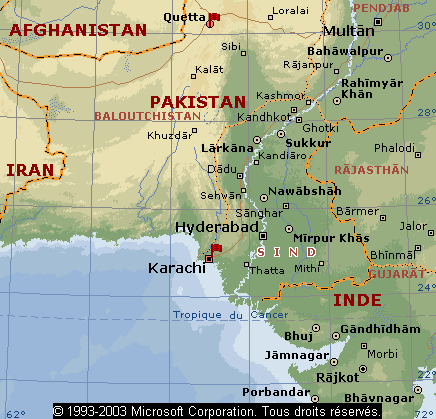

http://www.reuters.fr/locales/c_newsArticle.jsp?type=topNews&localeKey=fr_FR&storyID=5295005
![]()
Emeutes à
Karachi après l'assassinat d'un religieux
![]()
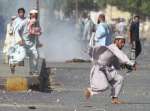
![]()
Sun May 30, 2004 2:12 PM CEST
KARACHI
(Reuters) - La mort violente d'un haut dignitaire musulman pakistanais favorable
aux taliban afghans a déclenché des heurts dimanche à Karachi, dans le sud du
Pakistan, qui ont fait une vingtaine de blessés.
Le
mufti Nizamuddin Shamzai, qui avait appelé à la guerre sainte contre les
Etats-Unis lorsqu'ils ont envahi l'Afghanistan et l'Irak, a été abattu par des
hommes armés à l'extérieur de sa mosquée de Karachi.
Il
a succombé à ses blessures après son transfert à l'hôpital.
"C'est
purement un acte terroriste commis par ceux qui veulent l'anarchie et le chaos
et qui veulent créer des tensions religieuses", a condamné le ministre
pakistanais des Affaires religieuses, Ijazul Haq.
L'annonce
sa mort a suscité des manifestations spontanées dans plusieurs quartiers de
Karachi. Plusieurs milliers de personnes se sont rassemblées près de l'école
coranique qu'il dirigeait.
Des
échauffourées ont éclaté avec les forces de l'ordre. De sources médicales,
on avance un bilan provisoire de 17 blessés, dont cinq personnes touchées par
balles.
Selon
le conseiller provincial à la sécurité, Shamzai faisait l'objet de menaces de
mort et le gouvernement lui avait attribué des gardes du corps armés.
"C'était un assassinat ciblé et selon nos informations, dix à douze
personnes sont impliquées", a ajouté Aftab Sheikh.
D'après
le récit d'un témoin, au moins quatre hommes armés ont ouvert le feu contre
ce dignitaire sunnite qui comptait parmi les plus respectés du Pakistan.
Selon
la chaîne de télévision privée Geo, ses agresseurs ont pris la fuite en moto
et en voiture.
Nizamuddin
Shamzai appartenait à l'école de pensée Deobandi, qui a fourni des milliers
de combattants aux taliban en Afghanistan voisine.
http://permanent.nouvelobs.com/etranger/20040530.FAP5568.html?1433
Un haut responsable
religieux sunnite abattu à Karachi
P Photos KAR101-109
KARACHI, Pakistan (AP) -- Un religieux sunnite pakistanais proche des talibans a
été abattu par des inconnus dimanche à Karachi, déclenchant des émeutes
dans la ville, des milliers de ses partisans s'en prenant à des magasins, des
banques, et un poste de police.
Au moins trois policiers et quatre manifestants ont été blessés dans des
échanges de tirs, selon la police, alors que les partisans du Mufti Nizamuddin
Shamzai scandaient des slogans contre les chiites, laissant craindre une
nouvelle flambée de violence entre les deux communautés religieuses.
Le mufti a été tué par un groupe armé circulant dans deux voitures et sur un
moto alors qu'il se rendait en camionnette à son école coranique dans l'est de
la ville. Un de ses gardes du corps a riposté, blessant six des assaillants,
toujours selon la police. Quatre personnes qui voyageaient avec le religieux,
dont un de ses fils et un neveu, ont été légèrement blessés. Le mufti est
lui mort des suites de ses blessures après son arrivée à l'hôpital.
Shamzai, un érudit âgé d'environ 70 ans, était proche de l'ancien régime
afghan des talibans et opposé aux interventions américaines en Afghanistan et
en Irak. Il dirigeait la madrasa Jamia Islamia à Binori Town, qui a formé des
milliers d'étudiants en religion, et avait rencontré Oussama ben Laden et le
mollah Mohammed Omar, peu avant les attentats du 11 septembre.
Immédiatement après l'attentat, des milliers d'étudiants des madrasas de tous
les secteurs pachtouns de la ville sont descendus dans les rues, allumant des
incendies et lançant des pierres sur les véhicules. Des centaines d'entre eux
ont attaqué un commissariat de police proche de la madrasa de Binor Town, ou
encore des banques, des cinémas, le siège d'un journal et nombre de boutiques.
La police était sur les dents, cherchant notamment à protéger les mosquées
et centres chiites contre la colère des partisans du mufti.
Les émeutiers ont mis le feu à l'Institut Quaid-e-Azam, qui mène des
recherches sur le père fondateur du Pakistan, Mohammed Ali Jinnah.
Karachi, principale ville du Pakistan et sa capitale commerciale, immense
métropole de 14 millions d'habitants, et souvent en proie à la violence
intercommunautaire et aux attentats. La semaine dernière, un double attentat à
la voiture piégée a eu lieu près de la résidence du consul des Etats-Unis.
Le 7 mai, un attentat-suicide faisait 22 morts dans une mosquée chiite. AP
© Le Nouvel Observateur 1999/2000
(url manque)
Sunni Muslim cleric killed
30/05/2004 12:19 - (SA)
Police in
Some rioters fired
automatic weapons as police moved against a mob of 2 000 who attacked a
bank. The gunfire injured at least one uniformed officer and another man in
plainclothes. Earlier, police said two protesters suffered gunshot wounds.
The violence started after
gunmen riding in two cars and a motorcycle attacked the cleric, Mufti Nizamuddin
Shamzai, a fervent critic of the US-led wars in
A body guard of the cleric
returned fire and wounded one of the six attackers, Qureshi said, quoting
witnesses. Four others in Shamzai's vehicle were wounded - one of his sons, a
nephew, his driver and a bodyguard - but none seriously.
Shamzai, who was in his
70s, died of gunshot wounds in a nearby hospital.
No one claimed
responsibility for the killing, and there were no arrests.
Soft-spoken and
scholarly man
Angry students from Sunni
Muslim seminaries at ethnic Pashtun-dominated areas of the city poured onto the
streets, setting fires and pelting passing vehicles with stones. Riot police and
paramilitary rangers were deployed as security forces went on alert.
"Our task is to
protect Shiite worship areas as we fear a backlash on these areas," said
Major General Javed Zia, the chief of the paramilitary rangers in the city.
"We are co-ordinating with police to maintain law and order."
Shamzai, a soft-spoken and
scholarly man, was a strong supporter of
He rose to prominence
after the September 11, 2001, attacks on
Edited by Tisha Steyn
http://www.nytimes.com/aponline/international/AP-Pakistan-Cleric-Killed.html?ex=1086580800&en=b5e7532964ea06ab&ei=5062&partner=GOOGLE
By THE ASSOCIATED PRESS
![]()
Published: May 31, 2004
Filed at 3:05 a.m. ET
The situation was tense
but there was no immediate outbreak of violence following a day of unrest that
saw police fire tear gas and warning shots to disperse rioters who set fire to
banks, shops, a police station and a KFC fast-food restaurant.
Police formed a special
task force to investigate the slaying of Nazamuddin Shamzai, a cleric in his 70s
who had been a strong supporter of the former Taliban regime in neighboring
Afghanistan and had met al-Qaida chief Osama bin Laden.
The cleric, from the Sunni
branch of Islam, had a large following in
``We will not sit silent.
We will protest against the brutal murder of a great religious personality,''
Maulana Fazur Rahman, a senior leader of the forum, told reporters as he visited
Shamzai's home to express condolences.
``We will be forced to
take other steps if the killers of Nizamuddin Shamzai are not arrested,''
Maulana said, without elaborating.
Hundreds of policemen and
paramilitary rangers patrolled neighborhoods wracked by unrest Sunday. But
residents remained indoors or went about their business against a backdrop of
burned-out shopfronts and the carcasses of torched cars.
The identities of the
killers are unknown and no one has claimed responsibility. Police have issued a
sketch of one suspect.
Witnesses said the
assassination team included as many as six gunmen riding in two cars and a
motorcycle. They sprayed Shamzai's car with bullets Sunday morning, killing him
and wounding one of his sons, a nephew, a driver and a police bodyguard.
The shooting was condemned
Sunday by Prime Minister Zafarullah Khan Jamali as a ``dastardly act of
terrorism.''
Religious violence is
common in
The slaying of Shamzai,
who ran one of
http://www.ctv.ca/servlet/ArticleNews/story/CTVNews/1085916993844_101/?hub=CTVNewsAt11
Pro-Taliban
cleric shot dead in
![]()
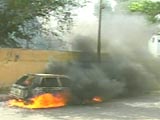
CTV.ca News Staff
Updated: Sun. May. 30 2004 2:38 PM ET
A
Sunni-Muslim cleric was gunned down in
An
outspoken critic of the U.S.-led wars in
Citing
police official Fayyaz Qureshi, The Associated Press reports that
assailants riding in two cars and a motorcycle opened fire, also wounding four
others.
One
of the six attackers was wounded in return fire, Qureshi said.
Shamzai,
who was in his 70s, later died of gunshot wounds at a nearby hospital.
Though
no one has claimed responsibility for the attack, the cleric's supporters were
quick to register their anger as they set fires and pelted vehicles with stones
as they passed through ethnic Pashtun-dominated areas of the city.
Riot
police and paramilitary rangers were deployed to contain the angry crowds opened
fire, wounding at least two protesters.
According
to the chief of the paramilitary rangers in the city, security officials fear
anger to grow into sectarian violence between Sunni Muslims and rival Shiites.
"Our
task is to protect Shiite worship areas as we fear a backlash on these
areas," Maj. Gen. Javed Zia told AP.
"We
are coordinating with police to maintain law and order."
Officials
say three policemen were beaten and several vehicles and offices destroyed when
hundreds of Shamzai supporters swept through.
At
one point, some 2,000 rioters attacked a building housing a bank and a newspaper,
prompting police to deploy from armored cars firing guns and tear gas. Automatic
fire was heard answering from within the crowd.
By
day's end, rioters had set fire to banks, shops, a cinema, a gas station and a
KFC fast food restaurant.
On
Sunday evening, tens of thousands of mourners gathered for Shamzai's funeral.
The 10-kilometre funeral procession was overseen by more than 15,000 police and
rangers.
Shamzai,
who headed the large
He
led a failed delegation of Pakistani clerics who tried to stem the
Sometime
before the Sept. 11 attacks, Shamzai reportedly met with Osama bin Laden as well
as reclusive Taliban leader Mullah Mohammed Omar.
In
recent weeks,
Last
week, twin car bombs exploded near the U.S. Consul's residence in the city of 14
million. And on May 7, 22 people died in a suicide bombing at a Shiite Muslim
mosque.
Militants
angry with President Gen. Pervez Musharraf's cooperation with the White House 'war
on terror' are blamed for much of the violence, but clashes are also common
between rival Sunnis and Shiites.
© Copyright 2004 Bell
Globemedia Inc.
http://www.reuters.fr/locales/c_newsArticle.jsp?type=topNews&localeKey=fr_FR&storyID=5305721
La piste de
l'attentat suicide est privilégiée à Karachi
![]()
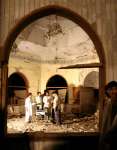
![]()
Tue June 1, 2004 8:47 AM CEST
par
Aamir Achraf
KARACHI
(Reuters) - La police pakistanaise privilégiait mardi la thèse de l'attentat
suicide au lendemain de l'explosion dans une mosquée chiite de la ville de
Karachi, dont le bilan s'est élevé dans la nuit à 19 morts.
Trois
autres personnes ont été tuées et une cinquante blessées dans les émeutes
qui ont éclaté après l'attentat contre la mosquée Ali Raza Imam Bargah et la
tension restait très forte mardi matin.
"C'était
apparemment un attentat suicide, parce que nous n'avons pas retrouvé de
cratère qu'aurait creusé une bombe", a déclaré un haut responsable de
la police de Karachi.
"Nous
n'avons pas pu réunir beaucoup d'indices parce qu'une foule en colère nous a
interdit d'entrer dans la mosquée. La situation est tendue", a-t-il
ajouté, précisant que les forces de l'ordre avaient été déployées en
nombre dans les quartiers chiites de cette ville du sud du Pakistan.
Ce
déploiement n'a pas empêché de violents affrontements dans la nuit entre
chiites et forces de l'ordre. Une vingtaine de voitures ainsi que deux
stations-service ont été incendiées ainsi qu'une agence bancaire.
Trois
émeutiers qui s'étaient emparés d'une ambulance ont été abattus par les
forces de l'ordre.
La
police s'attend à de nouvelles émeutes lors des funérailles des victimes de
l'attentat, programmées dans la journée de mardi.
La
population redoutait de nouvelles violences entre sunnites et chiites à Karachi
après l'assassinat, dimanche, du mufti Nizamuddin Shamzai. Ce haut dignitaire
sunnite, favorable aux taliban afghans, avait appelé à la guerre sainte contre
les Etats-Unis lorsqu'ils avaient envahi l'Afghanistan et l'Irak.
Sa
mort a provoqué dimanche des émeutes qui ont fait une vingtaine de blessés.
La
mosquée chiite Ali Raza Imam Bargah est située à un kilomètre seulement de
l'endroit où Shamzai a été tué.
Une
précédente attaque contre une mosquée chiite de Karachi a fait 24 morts et
125 blessés le 7 mai dernier lors de la grande prière hebdomadaire du
vendredi.
Les
violences confessionnelles entre sunnites (qui représentent environ 70% de la
population pakistanaise) et chiites (20%) ont fait 150 morts au cours de la
seule année écoulée.
Selon
la télévision d'Etat, le président pakistanais, Pervez Musharraf, a exigé
que le gouvernement provincial de Karachi rétablisse l'ordre et réprime les
responsables de ces attentats.
Quelque
15.000 policiers et paramilitaires ont été déployés dans les rues de
Karachi.
http://story.news.yahoo.com/news?tmpl=story&u=/040601/photos_wl_pc_afp/040601195850_tpkm4q1d_photo0
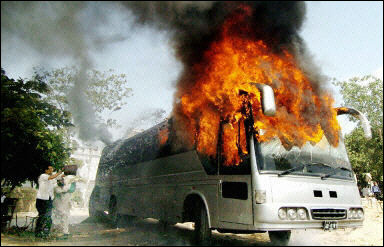
Tue
Jun 1, 3:58 PM ET
![]()
Two Pakistani men throw water as they attempt to douse
the flames of a bus set on fire in
http://www.nytimes.com/2004/06/01/international/asia/01stan.html
The New
York Times
14 Die in Bombing of Shiite Mosque in
By SALMAN MASOOD
![]()
Published: June 1, 2004
The bombing was the fourth
terrorist incident in a single month in
President Pervez
Musharraf, who has vowed to crack down on Islamic militancy and has banned
several sectarian groups, expressed his deep concern and vowed to take serious
action to stop violence in the city.
The attack happened around
7:45 p.m. at Imambargah Ali Raza Mosque in an upscale
Local news channels were
filled with images of badly burned worshipers being carried to ambulances and of
rescue workers scrambling to help the wounded.
After the blast, young
demonstrators gathered on various streets in
Dozens of people were
reported wounded in the clashes, and at least two people were killed by police
gunfire, a private news channel reported.
Some government officials
speculated that the explosion could have been in retaliation for the killing of
a prominent Sunni leader, Mufti Nizamuddin Shamzai, by unidentified gunmen in
Leading religious
scholars, both Sunni and Shiite, and politicians all condemned the bombing as an
attempt to create chaos.
The governor of
The sectarian violence in
The recent spate of
violence has set off a wave of panic, creating unrest especially among the
minority Shiites, who make up about 20 percent of the population. Violence
between Sunnis and Shiites has killed more than 1, 200 people in
The terror attacks this
month began May 7, when 22 people were killed by a suicide bomber at a Shiite
mosque. On May
http://www.reuters.com/newsArticle.jhtml?type=worldNews&storyID=5308177
Reuters
Angry Shi'ites Mourn 19 Killed in
Tue
Jun 1, 2004 06:33 AM ET
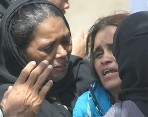
By
Aamir Ashraf
KARACHI (Reuters) - Angry Shi'ite Muslims clashed with
police during funerals on Tuesday for many of the 19 people killed in an
apparent sectarian suicide bombing of a mosque in the Pakistani city of Karachi.
Riot police fired tear gas to drive back crowds of
thousands gathered for the funerals as some people pelted them with stones and
torched nearby vehicles.
"We have no faith in police and rangers because
they failed to protect our mosques," senior Shi'ite cleric Hasan Zafar
Naqvi said. "We demand that the government deploy the army to ensure their
security and safety."
The ceremonies were held in front of the Ali Raza Imam
Bargah mosque, on one of
The explosion wounded at least 50 people, some
seriously, and three Shi'ites died later in clashes with police.
The bombing appeared to be the latest in a spate of
tit-for-tat sectarian violence in the volatile port city, coming less than 24
hours after the killing of Mufti Nizamuddin Shamzai, a senior cleric from
Thousands of angry Shi'ite mourners beat their chests
and chanted "God is Greatest" as friends and relatives bore caskets
draped in white and black cloth. Some waved wooden stakes and iron bars and
chanted "Down with
Police and paramilitary troops from among the 15,000
deployed in a failed attempt to protect Shi'ite mosques kept their distance
after Monday's rioting, in which angry crowds set ablaze 20 vehicles, two
filling stations and a local bank.
But they fired in the air when some mourners threw
stones at them.
Naqvi complained that police had detained at least 30
Shi'ite mourners and demanded their immediate release.
Shops and businesses in
It was the second bloody attack on a Shi'ite mosque in
"It was apparently a suicide attack, because we
did not find any crater caused by bomb explosion," a senior police official
said on condition of anonymity. "The situation is tense. There is a high
deployment of police and rangers in Shi'ite areas."
A suspected Sunni suicide bomber killed 24 people and
wounded
MUSHARRAF DEMANDS ACTION
State television said President Pervez Musharraf had
ordered the provincial government in
In a speech in
The mosque targeted in the bombing was less than a mile
from where Shamzai, a pro-Taliban cleric who called for "jihad," or
holy war, against the
While the latest bombing smacked of decades-old
sectarianism, analysts say it appears Sunni militants have been using attacks on
Shi'ites as part of a broader campaign to undermine Musharraf and his support
for the U.S.-led war on terror.
Violence between Sunnis, who make up about 70 percent
of
Analysts and diplomats have expressed fears the new
round of violence could provoke fresh attacks on Western targets.
Last Wednesday, a policeman was killed and more than 30
people hurt when two car bombs detonated by suspected Sunni militants exploded
near the home of the
Ingrained hatred Shi'ites also feel for the United
States has not ebbed despite the U.S. focus on containing Sunni militancy after
the September 11 attacks in 2001 and the mood has been exacerbated by U.S.
clashes with Shi'ites in Iraq.
Such feelings date back to
http://212.2.162.45/news/story.asp?j=106117448&p=yx6yy8y54&n=106118208
Mourners
riot at Karachi bomb attack funerals
01/06/2004
- 12:28:57
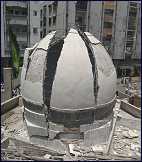
Police clashed with rioting mourners today as thousands attended the funerals
of 19 people killed in an apparent suicide bombing that ripped through a
crowded Shiite Muslim mosque in
About 200 angry Shiites set fire to three buses, a bank, bus company offices
and shops housed in one building a few doors down from the mosque hit in
yesterday’s bombing.
Hundreds of police fired tear gas at the crowd along a major highway in the
southern city of
Fearing sectarian clashes between rival Shiite and Sunni Muslims, thousands of
police and paramilitary rangers were on maximum alert, and were also equipped
with live ammunition, although there were no reports of firing.
Two processions of thousands of mourners set off in different directions after
prayers at the wrecked Imam Bargah Ali Raza mosque, leaving the rioters
behind. The unrest began after the mob started stoning police.
President General Pervez Musharraf pledged action to stem the wave of
bloodletting. The bombing ripped through the mosque during evening prayers,
also injuring at least 42 people, police said.
The attack sparked nighttime rioting by hundreds of enraged Shiite youths who
burned shops, cars, a bank and a government building and blocked highways and
the main rail line. A shootout between rioters and police left three more
people dead.
No one claimed responsibility for the bombing. But
http://radio-canada.ca/nouvelles/International/nouvelles/200406/01/004-PAKISTANMARDI.shtml
Musharraf lance un appel au calme
Mise à jour le mardi 1 juin 2004, 12 h
45 .
|
. Pervez Musharraf |
Le
président pakistanais Pervez Musharraf lance un appel à la modération au
lendemain de l'attentat qui a causé la mort de 19 Chiites, à Karachi.
L'homme fort du Pakistan, qui est un allié des États-Unis dans sa guerre au
terrorisme, exhorte aussi musulmans et occidentaux à régler leurs différents
afin d'éviter de sombrer dans la barbarie. Il demande aux deux parties de
revoir leurs politiques, écorchant à la fois l'impérialisme américain et
l'extrémisme religieux.
Bombe à Karachi après l'assassinat d'un mufti
|
. |
La
tension monte entre les communautés religieuses sunnite et chiite
pakistanaises.
L'explosion d'une bombe dans une mosquée chiite de Karachi, lundi, a fait au
moins 19 morts et 35 blessés. Des dizaines de personnes étaient réunies pour
la prière du soir lorsque la déflagration s'est produite.
Des émeutes ont aussitôt éclaté dans le quartier et des coups de feu ont
été échangés avec la police.
|
. |
La
mosquée se trouve à moins d'un kilomètre de l'endroit où le théologien et
dignitaire sunnite Nizamuddin Shamzai a été assassiné, dimanche.
Des hommes armés avaient fait feu sur le mufti au moment où il sortait de son
domicile. Le fils du religieux et deux autres personnes qui l'accompagnaient ont
été blessés dans l'attentat, qui n'a pas été revendiqué.
Pour venger sa mort, des partisans du mufti s'en sont pris à un bureau de
police, blessant par balle trois policiers.
|
. |
Âgé
de 70 ans, Nizamuddin Shamzai entretenait des relations avec l'ancien régime
taliban en Afghanistan et il s'opposait aux interventions américaines dans ce
pays.
Il avait organisé plusieurs manifestations anti-américaines après le
renversement des talibans en 2001.
http://sfgate.com/cgi-bin/article.cgi?file=/news/archive/2004/06/01/international1222EDT0613.DTL
Pakistani
city faces third day of riots after cleric killed, mosque bombed
- ZARAR KHAN, Associated Press Writer
Tuesday, June 1, 2004
(06-01) 09:22 PDT
Shiite Muslims enraged by
a mosque bombing that killed 20 worshippers battled police and burned American
fast-food restaurants Tuesday as the government struggled to contain a third day
of violence in Pakistan's largest city.
Mass funerals for the
victims of Monday's attack sparked what appeared to be orchestrated rioting as
hundreds of youths rampaged near the wrecked Imam Bargah Ali Raza mosque,
stoning police and setting fire to shops and buses.
Along a quarter-mile
battle-scarred stretch of
Police Chief Asad Ashraf
Malik said four policemen were wounded by gunfire, and that 150 had been
arrested -- in addition to more than 50 detained during street riots Monday
night.
Asad threatened more
force.
"We have decided not
to be lenient. If anyone goes on the streets to cause trouble, they will be
dealt with strictly," he said.
But the city has endured
three unusually turbulent weeks since a May 7 suicide attack at a Shiite mosque
killed 22 people. It was followed by bloody clashes during elections that left
at least 10 dead and a twin car bombing near the
The drive-by shooting
Sunday of prominent Sunni cleric, Nazamuddin Shamzai, made matters much worse,
triggering unrest and raising fears of sectarian clashes -- a fear magnified
after Monday's bombing at the Shiite mosque that killed 20 people and injured
75. Police suspect it was a suicide attack but have few clues about who was
behind it.
No one has claimed
responsibility for any of the recent attacks.
Musharraf pledged action
to stem the bloodshed, but no new measures were announced. Separately, he warned
in a speech to representatives of Muslim countries that the world risked
plunging into an "abyss of barbarism" unless it tackled the poverty
and alienation that feeds Islamic extremism.
Information Minister
Sheikh Rashid Ahmed said the president was expected to make "important
decisions" in the coming days -- perhaps replacing the leadership of the
"There could be
changes at important places," Ahmed told The Associated Press.
Among the estimated 10,000
mourners who gathered for the funerals of the victims of Monday's bombing, many
vented anger at Musharraf, chanting "Death to
A few hundred of the
mourners started stoning police, who fired tear gas. Rioters set fire to buses,
shops and offices near the mosque, leading to exchanges of gunfire. Riots broke
out in four or five other places in the city.
Malik, the police chief,
said that in all, about 35 vehicles and 12 to 15 shops and restaurants were
burned, including a KFC and a McDonald's.
Shiite clerics had earlier
urged mourners to show restraint during the mass funerals that proceeded to two
different Shiite graveyards, the route patrolled by police in riot gear.
"Everybody who is a
Muslim should understand that some elements want to create unrest," said
Yousaf Hussain, a Shiite leader. "They are the enemy of
The May 26 twin
car-bombing near the
Harkat is accused of a
failed attempt to assassinate Musharraf with a car bomb in 2002 and of a car
bombing at the U.S. Consulate in the same year that killed 14 people.
©2004 Associated Press
http://www.guardian.co.uk/worldlatest/story/0,1280,-4159815,00.html
Wednesday June 2, 2004 3:01 PM
By ZARAR KHAN
Associated Press Writer
Government
officials struggled to explain what was behind the wave of violence, with one
accusing al-Qaida of trying to spark sectarian fighting between the Sunni Muslim
majority and the Shiite minority.
Police
closed roads and took position outside the U.S. Consulate, a frequent target of
terrorist attack in recent years, after a Shiite group announced plans to
demonstrate there.
The
chief minister of Sindh province, Ali Muhammad Maher, met with security chiefs
to discuss the worsening situation in the city of 14 million people, triggered
by the assassination of a prominent Sunni cleric Sunday and the suicide bombing
of a Shiite mosque a day later that killed 20 people. No one has claimed
responsibility for either attack.
Three
days of rioting by Sunni and Shiite mobs followed the attacks, with most
violence - including gunfire - aimed at hundreds of riot police deployed in
different neighborhoods. Shops, cars, buses and government buildings were set
afire. Four people, all civilians, died in exchanges of gunfire.
``We
cannot leave
The
rioters have vented anger at
That
bombing was followed by violence during by-elections that left 10 dead and the
twin car-bombing a week ago near the residence of the U.S. Consul-General that
killed a policeman and wounded 40 others.
Religious
Affairs Minister Ijazul Haq told a news conference in the capital,
``There
are no Sunni fighting Shiites,'' Haq said. ``There is no sectarian fighting. But
the whole purpose behind this is that there should be a Shiite-Sunni clash. This
is a very well-calculated strategy, which is being implemented by terrorists.''
Earlier,
Abdur Rauf Chaudhry, an Interior Ministry spokesman, refused to speculate on an
al-Qaida role and said, ``We think they were sectarian incidents.''
Only
scattered violence was reported Wednesday, with groups of youths throwing stones
in some places and one vehicle set afire. Shopkeepers closed their shutters and
many workers stayed home to protect their lives and vehicles.
Police
freed about 60 of the 150 people they had detained during the previous three
days and kept up heavy patrols.
An
Islamic fundamentalist rke in
About 80 percent of
Guardian
Unlimited © Guardian Newspapers Limited 2004
http://www.albayane.ma/Detail.asp?article_id=42346
Emeutes à Karachi lors des obsèques des victimes du terrorisme (6/2/2004)
Des
affrontements ont opposé émeutiers à la police mardi à Karachi (sud du
Pakistan) lors des obsèques des 19 victimes d'un attentat suicide contre une
mosquée chiite de la ville à l'heure de la prière, ont rapporté des
témoins.
Le président pakistanais, Pervez Musharraf, "gravement préoccupé"
s'apprêtait de son côté à prendre d'importantes mesures contre les violences
qui secouent depuis plusieurs semaines la principale ville du pays, a déclaré
le ministre de l'Information Sheikh Rashid.
"Il va prendre une décision importante pour protéger et épargner des
vies et rétablir l'ordre", a-t-il dit à l'AFP. Il n'a pas indiqué
quelles étaient les mesures envisagées mais a précisé qu'elles pourraient
intervenir dans les prochains jours.
Des milliers de personnes s'étaient rassemblées mardi pour les obsèques des
victimes de l'attentat de la veille.
Après l'échec de négociations avec la police sur le défilé, des
manifestants ont mis le feu à un car de police, à un mini-bus, à six motos et
à une banque. Un peu plus loin, plusieurs boutiques ont également été
pillées et certaines incendiées, selon des témoins.
La police a répliqué par des tirs de grenades lacrymogènes. Aucune victime
n'a été signalée dans l'immédiat.
Dans les heures qui ont suivi l'attentat, des violences avaient déjà éclaté
faisant trois morts, victimes d'échanges de coups de feu entre la police et des
manifestants. Une vingtaine de voitures ont également été incendiées.
L'attentat de lundi s'est produit alors que des dizaines de fidèles assistaient
à la prière du soir dans une mosquée située non loin du quartier où le
mufti sunnite Nizamuddin Shamzai, 70 ans, avait été tué dimanche.
Le premier bilan de 15 morts et 35 blessés s'est alourdi avec le décès de
quatre des blessés, a annoncé mardi la police.
Pour éviter un engrenage de représailles après l'assassinat du dignitaire
sunnite, 15.000 policiers et miliciens avaient pourtant été déployés dans la
ville, port de 14 millions d'habitants, où les violences inter-confessionnelles
entre sunnites majoritaires et chiites ont fait plus de 4.000 morts depuis les
années 1980.
Mardi, la police privilégiait la piste d'un attentat suicide. "Nous avons
ramassé des morceaux de corps indiquant qu'il s'agissait d'une explosion
suicide. Et il n'y a pas non plus de cratère sur le site", a expliqué un
enquêteur, Manzoor Mughal.
L'attentat n'a pas été revendiqué mais la police l'a qualifié d'acte de
terrorisme.
Depuis le 7 mai, date d'un attentat suicide à la voiture piégée dans une
mosquée chiite, qui avait fait 23 morts et une centaine de blessés, Karachi a
connu un regain de violence. Le 25 mai, des bombes ont tué deux personnes et,
le lendemain, l'explosion de deux voitures piégées près de la résidence du
consul général des Etats-Unis a fait un mort et 32 blessés.
Le ministre Cheikh Rashid a démenti mardi que les autorités pakistanaises
aient perdu le contrôle de Karachi, creuset de rivalités ethniques,
religieuses et politiques, longtemps considéré comme un repère de trafiquants
d'armes et de drogue et aujourd'hui comme un havre pour des militants islamistes
chassés d'Afghanistan.
Pour le leader chiite Hasan Turabi, l'assassinat de Shamzai et l'attentat qui
s'en est suivi représentent "une tentative de diviser les deux
communautés musulmanes".
Shiite
Muslims raise their hands as they chant anti-government slogans in protest of a
bombing of a Shiite mosque in
http://news.yahoo.com/news?tmpl=sl&g=events/wl/060104karachiblast&l=&e=3&printer=1
Police officers take away a religious student as they
disperse protesters during a rally against Monday's bombing of Shiite Muslim
mosque that killed dozens of people in
http://66.132.136.245/DisplayArticle.asp?xfile=data/subcontinent/2004/June/subcontinent_June175.xml§ion=subcontinent
(AFP)
7 June 2004
“We have decided to bring certain areas which remained under constant
threat from the terrorists like the US consulate and other foreign missions
under high security zones,” Karachi police chief Tariq Jamil told AFP.
Crack police commandos would be deployed and emergency centres would be
established in the zones, in which roads could easily be closed in case of any
threat, he said.
“These areas will have special status as far as security is concerned,”
Jamil said.
“The decision has been taken as in the past two years there have been
suicide bombings and terrorist attacks, besides constant threats,” he said.
Areas around the local headquarters of army, police and paramilitary
rangers, the
The decision was taken after five terror attacks in the city, including
two sectarian-related suicide bombings, which triggered riots.
On May 26 two car bombs exploded near the residence of the
One day before a parcel bomb at
Two suicide bombers struck at mosques used by the Shiite Muslim minority
on May 7 and May 31, killing 44 worshippers in total. On May
Another three people were killed in rioting after the cleric was killed
and after the May 31 mosque attack.
Since the
In January 2002
http://lecourrier.vnagency.com.vn/default.asp?CATEGORY_ID=14&NEWSPAPER_ID=29&TOPIC_ID=9&REPLY_ID=17884
Le
Courrier du Vietnam, 04-06-09
Pakistan :
Crise politique dans le Sud après les attentats de Karachi
Le
gouverneur de la province du Sindh, dans le Sud du Pakistan, a dissous le 8 juin
le gouvernement régional et convoqué une session d'urgence du parlement,
après que le chef du gouvernement local eut démissionné à la suite de la
série d'attentats qui a ensanglanté Karachi le mois dernier.
Ali Mohammad Maher a démissionné le 7 juin soir après qu'une cinquantaine de
personnes eurent été tuées dans des violences en mai dans la plus grande
ville du Pakistan. Le gouverneur du Sindh, Ishratul Ibad, a convoqué le
parlement régional pour qu'il élise un nouveau dirigeant le 9 juin.
Le chef de la police de Karachi avait été renvoyé la semaine dernière après
les attentats et des émeutes qui avaient suivi. Le président Pervez Musharraf
a promis des mesures pour faire reculer la violence et aurait déclaré à un
proche collaborateur vouloir que "des têtes tombent" dans
l'administration du Sindh. Trois candidats sont pressentis pour remplacer le
chef du gouvernement, M. Maher, tous membres de la coalition des partis
soutenant le président Musharraf au niveau fédéral. Mais des observateurs
doutent qu'un changement de gouvernement soit suffisant pour apaiser cette ville
de 14 millions d'habitants où la violence est endémique.
AFP/VNA
( 09/06/04 )